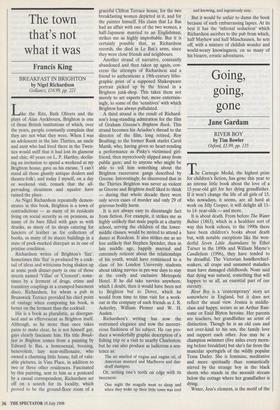Going, going, gone
Jane Gardam
RIVER BOY by Tim Bowler Oxford, £5.99, pp. 135 The Carnegie Medal, the highest prize for children's fiction, has gone this year to an intense little book about the love of a 15-year-old girl for her dying grandfather. If it won't change the life of all girls of 15, who nowadays, it seems, are all hard at work on Jilly Cooper, it will delight all 11- to 14- year-olds — and more.
It is about death. From before The Water Babies (1863), which in a healthier sort of way this book echoes, to the 1990s there have been children's books about death but, with notable exceptions like the won- derful Seven Little Australians by Ethel Turner in the 1890s and William Mayne's Candlefasts (1996), they have tended to be dreadful. The Victorian handkerchief- soakers, all crape and unnamed maladies must have damaged childhoods. None said that dying was natural, something that will happen to us all, an essential part of our eternity.
River Boy is a 'contemporary' story set somewhere in England, but it does not reflect the usual view. Jessica is middle- class and happy, secure as an Arthur Ran- some or Enid Blyton heroine. Her parents are teachers, her grandfather an artist of distinction. Though he is an old cuss and not over-kind to his son, the family love and support each other. Jess may be a champion swimmer (five miles every morn- ing before breakfast) but she's far from the muscular sportsgirls of the wildly popular Tessa Duder. She is feminine, meditative and more spiritually than romantically stirred by the strange boy in the black shorts who stands in the moonlit stream below the cottage where her grandfather is dying.
Water, Jess's element, is the motif of the book. She is drawn to it, plays in it, fights against it, masters it, occasionally lets it sweep her sensuously away. She learns (the epigraph is from Ecclesiastes) that all rivers run to the sea and that whence rivers come, thither they return again. Ancient, unful- filled Grandpa, his last, best painting unfin- ished on the easel, is the same person as the river boy who is just setting out.
Why will this book please the young? Do they need all this consolation? The dia- logue is wooden, the characters cardboard, the humour fairly lumbering, and it is a fable and fables make adolescents groan.
But there is a powerful undercurrent, Freudian if you like, but then, what isn't? Religious if you like, but then, what isn't? The atmosphere is haunting, the sense of a power beyond ourselves, strong and silent, and the mystery of the natural world, woodlands and airy hills and sliding, glitter- ing water are beautifully suggested, as is the strength — oh, subject most rare — of familial love. Mind, I think Bowler — this is only his second book — might have spared Jess and us her last climb up the waterfall with Grandpa's ashes, although it's going to bring some delicious tears. The book would have been stronger if this job had been taken over by the nice, wronged, neglected father. Jessica needs to go home now and read some Jilly Cooper.



























































 Previous page
Previous page